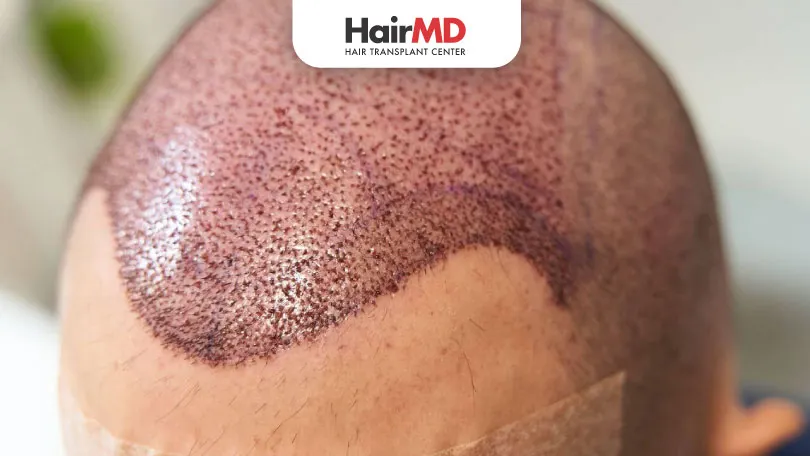22nd Nov, 2024

This article aims to provide a thorough understanding of the shedding process, how it varies among individuals, and what to expect during the regrowth phase, along with practical advice on scalp care and lifestyle tips.
What’s covered in the article?
- What is the Shedding Phase?
- Scalp Care During the Shedding Phase
- Nutrition and Lifestyle for Hair Regrowth
- Conclusion
What is the Shedding Phase?
The shedding phase is a normal part of the hair transplant recovery process. After the procedure at specialized clinics like HairMD Pune, the transplanted hair follicles typically enter a period where the hair shafts fall out, usually within the first 15 days to three weeks post-surgery. This is a temporary phase and indicates that the follicles are adapting to their new environment.
Why Does Shedding Vary Among Patients?
The body’s response to hair transplantation varies from person to person. For some, the shedding might be minimal, while for others, it could be extensive. This variability is largely due to individual differences in how the body reacts to the transplantation process, where hair follicles experience a temporary halt in growth, leading to shedding. It’s important to note that this is a natural part of the healing process and differs across patients.
Scalp Care During the Shedding Phase
Proper care of the scalp during the shedding phase is essential for recovery and future hair growth. Here are some tips:
- Gentle Cleansing: Use a mild, sulfate-free shampoo to cleanse your scalp, avoiding harsh chemicals that can irritate the skin.
- Avoid Scratching: Itchiness is common, but scratching can dislodge grafts. Use a gentle patting motion or consult a Dermatologist for safe solutions.
- Moisturization: Keep the scalp hydrated with doctor-recommended products to prevent dryness and flaking.
- Protect from Sun: Limit sun exposure by wearing a hat or using a sunscreen formulated for the scalp to prevent damage.
Managing Expectations
Understanding the timeline of hair regrowth is vital for managing expectations. Here are some insights:
- Temporary Shedding: Initial bald patches are temporary. Patience is crucial as hair regrowth will begin around the two-month mark.
- Gradual Regrowth: Noticeable hair growth generally occurs between six to seven months, but achieving full density can take up to 12 to 18 months.
- Consult Regularly: Regular follow-ups with your dermatologist, especially if you are treated at renowned centers like HairMD Clinic Pune, can help monitor progress and make necessary adjustments to your care routine.
Nutrition and Lifestyle for Hair Regrowth
- Balanced Diet: Incorporate a diet rich in proteins, vitamins, and minerals to nourish hair follicles. Foods high in zinc, iron, and vitamins A, B, C, and E can promote healthy hair growth.
- Hydration: Adequate water intake is essential for maintaining healthy, resilient hair.
- Stress Management: High-stress levels can negatively impact hair growth. Practice relaxation techniques such as yoga or meditation to maintain calmness.
- Exercise: Regular physical activity improves blood circulation, which can benefit hair follicles.
Do You Know?
Nearly 250 Patients Visit HairMD
Everyday For Various Hair Concerns?
(You are one click away from flawless skin)
Meet Our Dermatologists
Conclusion
Understanding the shedding phase and the subsequent regrowth process is key for anyone undergoing a hair transplant. While the sight of hair loss post-procedure can be unsettling, it is a normal and necessary step towards achieving desired results. By following these care tips and maintaining a healthy lifestyle, you can significantly aid the recovery process and enjoy a fuller, healthier head of hair in the months to come. Stay informed, stay patient, and embrace the journey towards hair restoration with confidence, especially when guided by experts at HairMD Pune.
Further Reading
What medications should be taken after a hair transplant?
Discover essential medications post-hair transplant like finasteride and minoxidil. Learn tips for care and recovery from HairMD Pune experts.
Side Effects of Hair Transplant: Insights from Dermatologist
Discover the side effects of hair transplant surgery, preparation tips, and long-term benefits with insights from Dr. Sachin Pawar at HairMD Pune.
How to Stop Hair Shedding After an Accident?
Learn about causes of hair shedding after an accident, including hormonal imbalance and stress. Discover effective treatments and tips for healthy regrowth.
Understanding Hair Transplant Results: Simple Guide for Patients
Explore hair transplant results, recovery phases, regrowth, & post-care tips to achieve natural-looking results. expert advice at HairMD
Have thoughts? Please let us know
We are committed not only to treating you, but also educating you.











